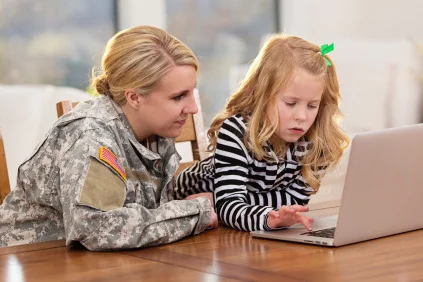+1 845 259 2974 (11 a.m to 7 p.m CST)
How can families cope with military mom’s overseas deployment?

Women make up about 14% of the U.S. military's active members. Mothers working for the military, especially those deployed overseas, often have to stay away from their families for long periods of time. Such separation can create various complications. Young children or teens could be adversely affected by their mother’s absence. There are dangers of the family bond getting weak. However, support from family and the father’s efforts can prevent the family from breaking apart and adapt to the military mom’s absence.
What problems do families face?
Kids depend on their mother not only for their physical needs, but also for psychological and emotional comfort. Maternal deprivation could make them feel insecure or anxious and they could become susceptible to behavioral and emotional issues.
The mother’s absence could be strongly felt during special occasions and family events. Kids would miss their mom especially when there is a reason for celebration or during moments of distress. They might receive an A at school or hurt themselves in playground. Being unable to communicate with the mother can cause sense of deprivation.
The family back at home and the moms working for the military look forward to the family reunion. However, the much anticipated homecoming might not turn out to be as exciting as imagined. The returning mom might have seen disturbing things that could cause her to lose her buoyant spirit. On the other side, kids might have changed over time, especially if they were too young when mom had to leave. They could become physically and emotionally distant from their mother. Reunion after a long deployment can cause awkwardness while communicating with the spouse and children. High expectations on both sides could result in disappointment.
How can families cope with the problems?
The pre-deployment time should be used to prepare kids for the inevitable separation. Parents should have age-appropriate conversations with kids explaining them why their mother has to leave and how she’ll continue to be an important part of their lives. The family should discuss how they will be communicating during the separation period.
The father is the primary and sometimes the only caregiver for children while their mom’s away. He would have to adjust to new family roles. If the father adapts well to his wife’s absence, the transition would be smooth for the kids too. Kids learn through observation; they are likely to do what they see their parent doing.
Fathers should encourage kids to maintain contact with their mother via email, phone calls, or any other mode of communication. They should communicate with their moms; especially when there are moments of rejoice. However, they might not always be able to reach her. Fathers should mentally prepare their kids for such disappointing moments.
It is quite natural for the dad to feel overburdened at times. Interacting with support groups and people going through similar situations could prove to be quite helpful. He should visit family and friends frequently. A visit to grandma’s place can cheer up the kids. This would not only serve as a distraction for kids but also allow the dad to seek help or assistance when needed.
Mothers in the military have to serve both the roles; that of a mom and also of a military service member. It isn’t easy for the kids to accept and adjust to their mother’s prolonged absence. The transition could be made smooth only through the collective efforts of parents, kids, relatives and friends. Planning and effort, particularly by the father, can help cope effectively with the issues of separation.





















